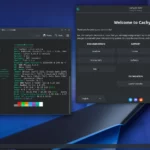Mozilla commits to updating Firefox on Windows 10

Microsoft may have all but abandoned Windows 10, but this is not true of its users. There are still millions of Windows 10 systems in use around the world, causing security concerns for many. But not all software developers are turning their backs on Windows 10 – Mozilla included.
The company has announced that “Firefox will continue to support Windows 10 for the foreseeable future”.
Firefox is finally getting MKV playback support

The MKV format (Matroska Video) is one that has been around for a very long time now, and it is loved for its high quality and flexibility. It has been supported by many web browsers, and even Windows 10, for quite some time, but not Firefox.
But now Mozilla is taking action to address this. Some eight years after a Bugzilla post requested the addition of MKV support to the browser, a developer has been assigned the task of implementing MKV playback in Firefox. So, what happens now?
Google is making it easier to switch your default browser to Chrome

Every company with a web browser wants you to choose it as your default. Google is no different with Chrome than Microsoft is with Edge or Mozilla is with Firefox.
Microsoft has received a lot of flak for the heavy-handed way in which it has prompted Edge and attempted to get users to switch to it. More than this the company has made it more difficult to set other browsers as default, although this has changed in recent times. Now Google is taking steps to promote Chrome, pushing a one-click-to-switch capability.
Linux users, rejoice! CachyOS fixes Nvidia issues and kills buggy browser

CachyOS is back with its latest May 2025 release, and yes, Nvidia users can finally breathe a sigh of relief. After months of headaches caused by the distro switching to the “open” Nvidia module, older GPUs like the 10xx series were left limping along with buggy Nouveau drivers. That mess is now cleaned up. The ISO now automatically detects your GPU and loads the correct driver.
The changes don’t stop there, folks. If you’re into aesthetics, the boot process just got a fresh coat of paint. There’s a new Plymouth boot animation and GRUB theme that help unify the distro’s visual identity. It’s a small touch, but it makes a difference.
Mozilla is shutting down Pocket

In a surprising move that will frustrate longtime fans, Mozilla has announced it will shut down Pocket on July 8, 2025. The once-popular “read-it-later” service, which helped users save and organize web content for later reading, will no longer function as normal after that date. While existing users can continue saving and reading articles until July, the service will switch to export-only mode afterward, with all user data permanently deleted on October 8.
Mozilla, which acquired Pocket in 2017, says it’s closing the platform due to changes in how people browse and consume content. The company wants to focus its resources on tools that better align with modern online habits. Despite shutting Pocket down, Mozilla will continue offering curated content through other channels like Firefox’s New Tab experience and a newly branded email newsletter.
Mozilla wants to show you the future in Firefox Labs

For those who like to live on the cutting edge, beta software, preview programs and the like are incredibly enticing. Just about every major software title -- operating systems, even -- has one or more preview builds available, and web browsers like Firefox are no different.
But Mozilla has a slightly different option for anyone who feels uncomfortable with the idea of installing alpha, canary, or beta builds of apps -- Firefox Labs. This is Mozilla’s way of giving users access to optional features which have not yet made it into the main version of the browser. Here are the unreleased features you can try out right now.
Firefox slaps itself on the back for finally adding tab groups and catching up with other browsers

The browser space, like so many other areas of software design, is one filled with inspiration and plagiarism. When one browser adds a new feature, you know it’s probably not going to be long before its rivals follow suit. Firefox is no different, but it likes to take its sweet time.
Mozilla has just launched a tab grouping option to its web browser, finally catching up with every other major browser in existence. Quite why it took so long to introduce what is such a common feature is not clear, but Mozilla has an awful lot to say about it.
OpenMandriva Lx 6.0 brings KDE Plasma 6 and Proton for running Windows games on Linux

The folks behind OpenMandriva have officially released version 6.0 of their Linux distribution. This is the fixed-point “Rock” release, and not the rolling edition, so it is all about stability rather than chasing the latest experimental packages.
KDE Plasma 6 is the star of the show here, serving as the default desktop environment. Users can choose between X11 or Wayland sessions, but there’s a catch. If you plan to run OpenMandriva Lx 6.0 in VirtualBox, X11 is strongly recommended. The team warns about problems with Wayland on VirtualBox’s emulated GPU, though things work fine on real hardware or in QEMU with KVM. For VirtualBox, don’t forget to set VMSVGA to avoid boot issues.
Google has lost its ad tech monopoly trial... and Mozilla is scared

In a decision that surprised few, a judge has ruled that Google is guilty of “willfully acquiring and maintaining monopoly power” in advertising technology. Google (or its parent company, Alphabet, at least) is obviously unhappy with the ruling, but it’s not the only one.
Mozilla was one of the first companies to react to the ruling, and CEO Laura Chambers has expressed alarm about what it means for the future of its Firefox web browser. She also voices concerns about the implication of the rules for the open web and online industries.
Mozilla to simplify Firefox extension installs with new data privacy system

Oh, thank heaven. Mozilla is finally doing something about the horribly messy (and sometimes confusing) data consent experience in Firefox extensions. If you’ve ever installed a Firefox add-on and been hit with some clunky, homemade data collection prompt, you’re not alone. Now, Mozilla is stepping in to cure the insanity. You see, the organization will be adding a standardized data consent system into the installation process.
This new system, expected to arrive later this year, will thankfully eliminate the need for developers to write their own data consent screens. Instead, extension creators will just declare what data the add-on collects in the manifest file. And just like that, Firefox will handle the rest.
Say goodbye to Microsoft Windows 11 and hello to Nitrux Linux 3.9.1

Windows 11 offers a familiar environment for users, but it’s not without its share of frustrations, particularly regarding performance issues and resource consumption on older hardware. Microsoft's updates frequently add new problems while fixing old ones, which is another annoyance.
If you’ve been considering a switch from Windows 11, Nitrux is the perfect alternative. The Debian-based distribution, known for its focus on simplicity and performance, has just been updated to version 3.9.1, codenamed “mk.” This release includes new features and a series of updates and fixes aimed at improving the overall experience for both new and existing users.
Firefox users have easy access to a powerful and customizable VPN with the Mozilla VPN extension

Mozilla is pushing its new VPN extension for Firefox as a way of simplifying the often confusing world of VPNs. Whether users are turning to a VPN for security, privacy, or to access content that’s only available in other countries, the Mozilla VPN extension is touted as a hassle-free option.
At the moment, the extension is only available for users of Firefox on Windows, but there are plans to release versions for Linux and macOS as well. Product manager for Mozilla VPN, Santiago Andrigo, explains what makes this VPN tool stand out from the crowd.
Firefox add-ons will stop working on March 14 if you don’t update

Firefox users running older versions of the web browser could be in for a really nasty surprise. On March 14, 2025, a critical root certificate will expire. And, if your browser isn’t updated to at least Firefox 128 (or ESR 115.13+ for those using the long-term support version) your add-ons will be disabled. Additionally, streaming services that require DRM may even stop working!
For anyone still using an outdated version on Windows, macOS, Linux, or Android, time is running out to avoid these annoyances. Even those sticking with older operating systems (such as Windows 7, 8, and 8.1, or macOS 10.12–10.14) need to at least update to ESR 115.13+ if they want to keep their add-ons and media playback working.
Forget Google Chrome and Firefox, LibreWolf is the privacy focused browser you've been looking for

Are you frustrated by Mozilla’s recent leanings towards putting revenue ahead of privacy? Fans of Firefox who are looking to take their privacy to the next level (and beyond any potential compromises Mozilla might make going forward) should take a look at LibreWolf, available for Windows, macOS and Linux.
LibreWolf is a direct fork from the latest version of Firefox with a raft of additional privacy measures added to make your browsing experience even more private.
New Firefox terms of use could push users to Google Chrome

Mozilla has long positioned itself as a champion of privacy and open-source software, but its latest move really makes me worry that the organization could be drifting away from those values. You see, Mozilla has introduced Terms of Use for Firefox for the first time ever. Additionally, there is an updated Privacy Notice. And while Mozilla frames this as a move toward transparency, the actual terms are raising some major red flags for me.
Mozilla claims these new terms are necessary due to a changing “technology landscape,” yet the fine print tells a far different story. One of the most troubling aspects is that users must grant Mozilla all rights necessary to operate Firefox, including a “nonexclusive, royalty-free, worldwide license” to use information entered through the browser. Mozilla insists this is meant to help users navigate the web, but the vague wording leaves a dangerous amount of room for interpretation. Could this include personal data, saved passwords, or browsing history? Mozilla simply fails to say.
Recent Headlines
Most Commented Stories
BetaNews, your source for breaking tech news, reviews, and in-depth reporting since 1998.
© 1998-2025 BetaNews, Inc. All Rights Reserved. About Us - Privacy Policy - Cookie Policy - Sitemap.